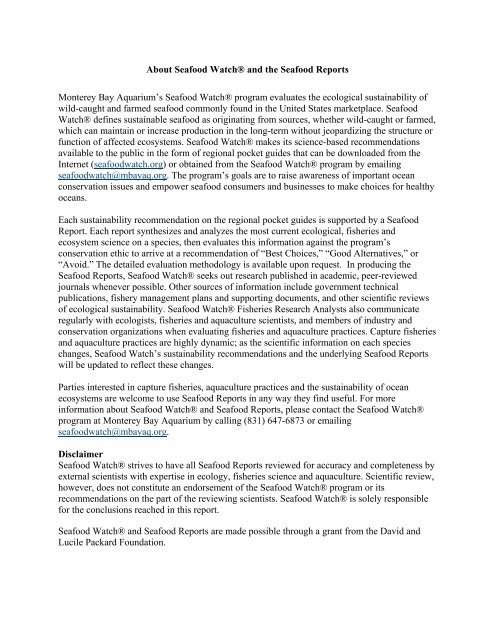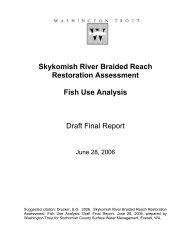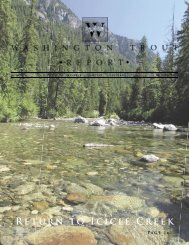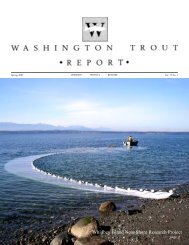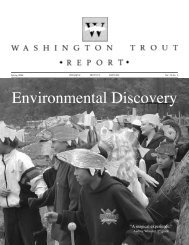Seafood Watch
Pacific Salmon - Wild Fish Conservancy
Pacific Salmon - Wild Fish Conservancy
- No tags were found...
You also want an ePaper? Increase the reach of your titles
YUMPU automatically turns print PDFs into web optimized ePapers that Google loves.
About <strong>Seafood</strong> <strong>Watch</strong>® and the <strong>Seafood</strong> Reports<br />
Monterey Bay Aquarium’s <strong>Seafood</strong> <strong>Watch</strong>® program evaluates the ecological sustainability of<br />
wild-caught and farmed seafood commonly found in the United States marketplace. <strong>Seafood</strong><br />
<strong>Watch</strong>® defines sustainable seafood as originating from sources, whether wild-caught or farmed,<br />
which can maintain or increase production in the long-term without jeopardizing the structure or<br />
function of affected ecosystems. <strong>Seafood</strong> <strong>Watch</strong>® makes its science-based recommendations<br />
available to the public in the form of regional pocket guides that can be downloaded from the<br />
Internet (seafoodwatch.org) or obtained from the <strong>Seafood</strong> <strong>Watch</strong>® program by emailing<br />
seafoodwatch@mbayaq.org. The program’s goals are to raise awareness of important ocean<br />
conservation issues and empower seafood consumers and businesses to make choices for healthy<br />
oceans.<br />
Each sustainability recommendation on the regional pocket guides is supported by a <strong>Seafood</strong><br />
Report. Each report synthesizes and analyzes the most current ecological, fisheries and<br />
ecosystem science on a species, then evaluates this information against the program’s<br />
conservation ethic to arrive at a recommendation of “Best Choices,” “Good Alternatives,” or<br />
“Avoid.” The detailed evaluation methodology is available upon request. In producing the<br />
<strong>Seafood</strong> Reports, <strong>Seafood</strong> <strong>Watch</strong>® seeks out research published in academic, peer-reviewed<br />
journals whenever possible. Other sources of information include government technical<br />
publications, fishery management plans and supporting documents, and other scientific reviews<br />
of ecological sustainability. <strong>Seafood</strong> <strong>Watch</strong>® Fisheries Research Analysts also communicate<br />
regularly with ecologists, fisheries and aquaculture scientists, and members of industry and<br />
conservation organizations when evaluating fisheries and aquaculture practices. Capture fisheries<br />
and aquaculture practices are highly dynamic; as the scientific information on each species<br />
changes, <strong>Seafood</strong> <strong>Watch</strong>’s sustainability recommendations and the underlying <strong>Seafood</strong> Reports<br />
will be updated to reflect these changes.<br />
Parties interested in capture fisheries, aquaculture practices and the sustainability of ocean<br />
ecosystems are welcome to use <strong>Seafood</strong> Reports in any way they find useful. For more<br />
information about <strong>Seafood</strong> <strong>Watch</strong>® and <strong>Seafood</strong> Reports, please contact the <strong>Seafood</strong> <strong>Watch</strong>®<br />
program at Monterey Bay Aquarium by calling (831) 647-6873 or emailing<br />
seafoodwatch@mbayaq.org.<br />
Disclaimer<br />
<strong>Seafood</strong> <strong>Watch</strong>® strives to have all <strong>Seafood</strong> Reports reviewed for accuracy and completeness by<br />
external scientists with expertise in ecology, fisheries science and aquaculture. Scientific review,<br />
however, does not constitute an endorsement of the <strong>Seafood</strong> <strong>Watch</strong>® program or its<br />
recommendations on the part of the reviewing scientists. <strong>Seafood</strong> <strong>Watch</strong>® is solely responsible<br />
for the conclusions reached in this report.<br />
<strong>Seafood</strong> <strong>Watch</strong>® and <strong>Seafood</strong> Reports are made possible through a grant from the David and<br />
Lucile Packard Foundation.


